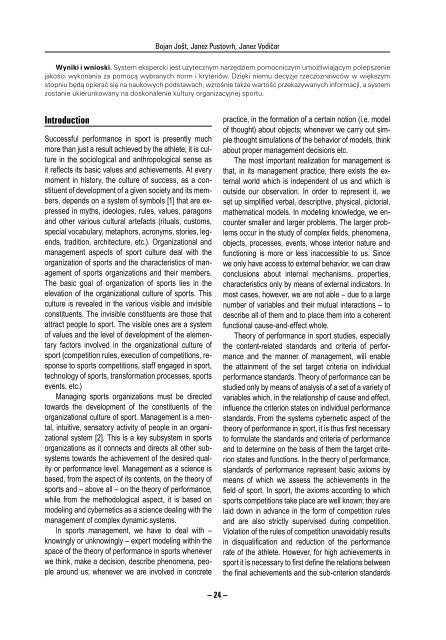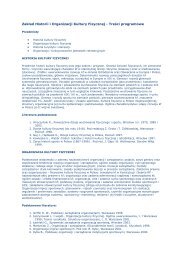full text - Akademia Wychowania Fizycznego w Krakowie
full text - Akademia Wychowania Fizycznego w Krakowie
full text - Akademia Wychowania Fizycznego w Krakowie
Create successful ePaper yourself
Turn your PDF publications into a flip-book with our unique Google optimized e-Paper software.
Bojan Jošt, Janez Pustovrh, Janez Vodičar<br />
Wyniki i wnioski. System ekspercki jest użytecznym narzędziem pomocniczym umożliwiającym polepszenie<br />
jakości wykonania za pomocą wybranych norm i kryteriów. Dzięki niemu decyzje rzeczoznawców w większym<br />
stopniu będą opierać się na naukowych podstawach, wzrośnie także wartość przekazywanych informacji, a system<br />
zostanie ukierunkowany na doskonalenie kultury organizacyjnej sportu.<br />
Introduction<br />
Successful performance in sport is presently much<br />
more than just a result achieved by the athlete; it is culture<br />
in the sociological and anthropological sense as<br />
it refl ects its basic values and achievements. At every<br />
moment in history, the culture of success, as a constituent<br />
of development of a given society and its members,<br />
depends on a system of symbols [1] that are expressed<br />
in myths, ideologies, rules, values, paragons<br />
and other various cultural artefacts (rituals, customs,<br />
special vocabulary, metaphors, acronyms, stories, legends,<br />
tradition, architecture, etc.). Organizational and<br />
management aspects of sport culture deal with the<br />
organization of sports and the characteristics of management<br />
of sports organizations and their members.<br />
The basic goal of organization of sports lies in the<br />
elevation of the organizational culture of sports. This<br />
culture is revealed in the various visible and invisible<br />
constituents. The invisible constituents are those that<br />
attract people to sport. The visible ones are a system<br />
of values and the level of development of the elementary<br />
factors involved in the organizational culture of<br />
sport (competition rules, execution of competitions, response<br />
to sports competitions, staff engaged in sport,<br />
technology of sports, transformation processes, sports<br />
events, etc.)<br />
Managing sports organizations must be directed<br />
towards the development of the constituents of the<br />
organizational culture of sport. Management is a mental,<br />
intuitive, sensatory activity of people in an organizational<br />
system [2]. This is a key subsystem in sports<br />
organizations as it connects and directs all other subsystems<br />
towards the achievement of the desired quality<br />
or performance level. Management as a science is<br />
based, from the aspect of its contents, on the theory of<br />
sports and – above all – on the theory of performance,<br />
while from the methodological aspect, it is based on<br />
modeling and cybernetics as a science dealing with the<br />
management of complex dynamic systems.<br />
In sports management, we have to deal with –<br />
knowingly or unknowingly – expert modeling within the<br />
space of the theory of performance in sports whenever<br />
we think, make a decision, describe phenomena, people<br />
around us; whenever we are involved in concrete<br />
– 24 –<br />
practice, in the formation of a certain notion (i.e. model<br />
of thought) about objects; whenever we carry out simple<br />
thought simulations of the behavior of models, think<br />
about proper management decisions etc.<br />
The most important realization for management is<br />
that, in its management practice, there exists the external<br />
world which is independent of us and which is<br />
outside our observation. In order to represent it, we<br />
set up simplifi ed verbal, descriptive, physical, pictorial,<br />
mathematical models. In modeling knowledge, we encounter<br />
smaller and larger problems. The larger problems<br />
occur in the study of complex fi elds, phenomena,<br />
objects, processes, events, whose interior nature and<br />
functioning is more or less inaccessible to us. Since<br />
we only have access to external behavior, we can draw<br />
conclusions about internal mechanisms, properties,<br />
characteristics only by means of external indicators. In<br />
most cases, however, we are not able – due to a large<br />
number of variables and their mutual interactions – to<br />
describe all of them and to place them into a coherent<br />
functional cause-and-effect whole.<br />
Theory of performance in sport studies, especially<br />
the content-related standards and criteria of performance<br />
and the manner of management, will enable<br />
the attainment of the set target criteria on individual<br />
performance standards. Theory of performance can be<br />
studied only by means of analysis of a set of a variety of<br />
variables which, in the relationship of cause and effect,<br />
infl uence the criterion states on individual performance<br />
standards. From the systems cybernetic aspect of the<br />
theory of performance in sport, it is thus fi rst necessary<br />
to formulate the standards and criteria of performance<br />
and to determine on the basis of them the target criterion<br />
states and functions. In the theory of performance,<br />
standards of performance represent basic axioms by<br />
means of which we assess the achievements in the<br />
fi eld of sport. In sport, the axioms according to which<br />
sports competitions take place are well known; they are<br />
laid down in advance in the form of competition rules<br />
and are also strictly supervised during competition.<br />
Violation of the rules of competition unavoidably results<br />
in disqualifi cation and reduction of the performance<br />
rate of the athlete. However, for high achievements in<br />
sport it is necessary to fi rst defi ne the relations between<br />
the fi nal achievements and the sub-criterion standards





![Antropomotoryka nr 57 [2012]. - Akademia Wychowania Fizycznego ...](https://img.yumpu.com/50213388/1/182x260/antropomotoryka-nr-57-2012-akademia-wychowania-fizycznego-.jpg?quality=85)











